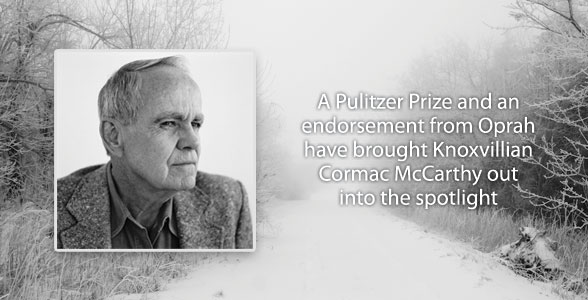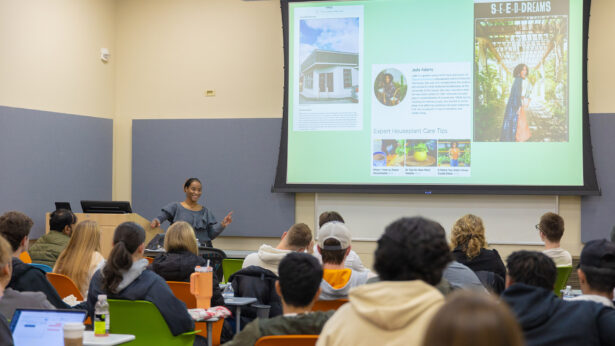For years Cormac McCarthy, Knoxville’s most famous living literary son, had something of a cult following. He seemed doomed to labor under the aesthetically fulfilling–if financially problematic–moniker of “writer’s writer,” a serious craftsman whose work remained a secret shared among a few fiercely loyal souls.
The secret is now out.
During the past year McCarthy’s standing has risen in the literary and popular consciousness. His most recent novel, The Road, published in late 2006, already had been greeted with a favorable critical reception before Oprah Winfrey selected it for her book club. But as with all things Oprah, her choice ensured a huge boost for the novel and its author, and McCarthy rose to the attention of millions of new readers.
Then in April of this year came the announcement that The Road had won the 2007 Pulitzer Prize for fiction. For the first time in his career, McCarthy has received both the commercial and the critical attention his work warrants.
The sense of mystery that surrounds McCarthy is largely due to his famous reclusion. Before being interviewed by Winfrey for her television show, he had granted only two interviews, to The New York Times and to Vanity Fair. Hence, for such a major literary figure, autobiographical information about Cormac McCarthy is somewhat scarce.
This much is known: McCarthy was born in Rhode Island on July 20, 1933, to Charles and Gladys McCarthy. Originally named Charles (after his father), he renamed himself Cormac after the ninth-century Irish king. In 1937 the family moved to Knoxville, and his father became a lawyer for the fledgling New Deal agency the Tennessee Valley Authority, eventually rising to the position of chief counsel.
McCarthy attended Catholic High School in Knoxville, then did two stints at UT Knoxville, from 1951 to 1952 and from 1957 to 1959, punctuated by a tour in the U.S. Air Force. During his second enrollment at UT, McCarthy published two short stories, “A Drowning Incident” and “A Wake for Susan,” in the student literary magazine, The Phoenix. While at the university, he won the Ingram-Merrill Award for creative writing in 1959 and 1960.
When McCarthy left the university the second time, it was for good. He went to Chicago, where he worked, apparently as an auto mechanic, while writing his first novel. He later married Lee Holleman, who had been a student at UT, and the couple settled in Sevier County, Tennessee. They had one son, Cullen, before their marriage ended.
Before McCarthy’s first novel, The Orchard Keeper, was published, he received a traveling fellowship from the American Academy of Arts and Letters. This prestigious award was no fluke; during his career he would also receive a Guggenheim Fellowship for Creative Writing, as well as a Macarthur Fellowship, the so-called “genius grant,” in 1981.
In 1965 he left America on the liner Sylvania, intending to visit the home of his Irish ancestors. On the trip he met Anne DeLisle, a young British singer and dancer who was working on the ship. They were married in England in 1966 and settled on the Spanish island of Ibiza, which was then a kind of artist’s colony. There, McCarthy completed his revisions of Outer Dark.
The couple returned to America in 1967 and settled near Knoxville, where McCarthy himself renovated a barn and built a fireplace with bricks he salvaged from the boyhood home of James Agee. DeLisle and McCarthy separated in 1976, and McCarthy moved to El Paso, Texas. They divorced a few years later. McCarthy married for a third time in the late 1990s, and he now lives in New Mexico, in Santa Fe, where he has served as an artist-in-residence at the renowned Santa Fe Institute.
Before The Road, most of McCarthy’s work could be sorted into two categories according to geographic setting. His first four novels were “Southern”–1965’s The Orchard Keeper, Outer Dark from 1968, 1973’s Child of God, and Suttree, published in 1979. His Western, Southwestern, and border works include Blood Meridian (1985) and the three novels of the acclaimed Border Trilogy–All the Pretty Horses, The Crossing, and Cities of the Plain, published between 1992 and 1998. No Country for Old Men, another novel set in southwest Texas, was published in 2005. Also included in his body of work are two plays and a screenplay.
McCarthy’s first novels are steeped in the history, myth, humor, and folkways of Knoxville and East Tennessee. The Orchard Keeper tells the tale of a trio of mountain folk who attempt to uphold traditional ways against the onslaught of modernity. Outer Dark is a disquieting gothic novel attuned to the violent and bloody frontier past of East Tennessee, whereas Child of God is a study in dispossession and marginalization, another macabre narrative made even more affecting by its stripped-down economical style.
Suttree is by far the most complex and aesthetically accomplished work in McCarthy’s Southern canon. It incorporates the themes explored in the first three novels and displays a deep affection for traditional communities and those displaced by commercialism. It is at times disarmingly allegorical and deeply metaphysical; at others it is brutally violent and very funny, often within a single passage. Suttree is as paradoxical and anachronistic as the region itself. As the preface to the novel informs us, the book is, like the city of Knoxville, “constructed on no known paradigm.”
Set in the early 1950s, Suttree follows the exploits and the philosophical crisis of Cornelius Suttree, who has shunned his family’s wealthy and privileged existence for a life designed to arrive at transcendental truth. He lives in a shabby riverboat home and revels in the hedonistic opportunities afforded by Knoxville and the community of McAnally Flats.
With Suttree, as with all of McCarthy’s work, the reader may be tempted to focus too intensely on the philosophical and metaphysical and overlook the fine comedic scenes. Suttree shares many traits with George Washington Harris’s 19th-century comic hero Sut Lovingood. Whether detailing midnight dalliances with watermelons, capturing ground-shaking wind problems at downtown diners, or recording the absurd entrepreneurial schemes of Gene “the city rat” Harrogate–which are doomed to fail at the moment of their conception–McCarthy, like the frontier humorists before him, is a highly skilled comedy writer.
Motifs and metaphors of journeying and wandering proliferate in McCarthy’s work, and they dominate in The Road, as well. The novel marks a return to McCarthy’s Southern roots after a series of novels set in the Southwestern borderlands. The story is a classically American road narrative of an unnamed father and son journeying through a post-apocalyptic wasteland. Although the landscape is destroyed and desolate, the prose that depicts it is clean, crisp, and lucid, and the economy of McCarthy’s style renders the novel’s pivotal events all the more poignant.
The father embodies the heroic qualities evident in many of McCarthy’s characters, and the manner in which McCarthy develops the relationship between father and son is one of the novel’s notable strengths. Many first-time readers of McCarthy have found The Road accessible, engrossing, and rewarding, so the novel is an ideal introduction to his work.
With The Road, McCarthy the “writer’s writer” is at last getting the wide recognition he deserves, both regionally and nationally.
Chris Walsh is a lecturer in the UT Knoxville English Department, which–in cooperation with the Cormac McCarthy Society–sponsored an April 2007 conference about the author.



